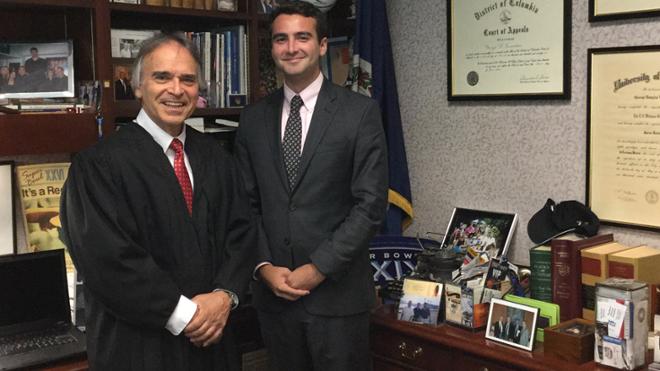T.J. Benedict, '17
Like many students considering a career in law, T.J. Benedict, ’17, wanted to spend his summer gaining a practical introduction to the practice of law. But what struck him most during his Jepson Internship at the Arlington Juvenile and Domestic Relations Court was the tangible and profound way in which the juvenile justice system impacts the lives of at-risk youth and their families every day.
“This internship exposes me to the various actors in the courtroom and the roles that judges, lawyers, and social workers play in carrying out the law,” says Benedict.
Benedict explains that many of the parties appearing in the court are affected by systematic issues related to poverty, drug addiction, mental health, immigration, and racial and cultural barriers. Judges, lawyers, social workers, clerks, and other court employees have a major impact on the daily lives of these parties.
“My Jepson education has given me a deeper understanding of these issues by equipping me to apply leadership theories to the real issues facing the parties involved in the courtroom,” says Benedict, a double major in leadership studies and philosophy, politics, economics, and law and a minor in history. “Justice and Civil Society introduced me to the various social issues that I have observed in court. The lessons I learned in Theories and Models are applicable to understanding the leadership styles of the judges, attorneys, deputies, and other individuals with leadership roles in the courtroom.”
Benedict gives examples of judges who are patient listeners and judges who use humor to create a relaxed atmosphere.
He notes, “The common denominator among the judges, however, is their ability to empathize with the parties in the courtroom. Through this leadership strategy, followers in the courtroom can feel valued, hopefully helping the court advance its goal of bettering the community.”
It was this display of empathy that surprised Benedict the most during his internship: “I admire how the judges engage with the individuals before them, giving each individual the opportunity to have their voice heard. In court the judges display genuine concern for the parties involved, offering words of encouragement to court-involved youth and families.”
Noting that leadership in the juvenile justice system is not limited to judges, Benedict describes a unique leader-follower relationship that exists between the court-involved youth and the social workers and parole officers. This relationship, which blends exchanged-based theories with personal relationships, incentivizes good behavior and exposes youth to positive role models, increasing the court’s potential to change the lives of the youth it serves.
Benedict discusses how the hard work of all courtroom personnel enables the court to run smoothly and “fulfill its mission of seeking the best outcomes for the people and community it serves.”
“My internship has given me a huge appreciation for the juvenile court system. I now understand how the court can positively impact the lives of at-risk youth,” says Benedict.
